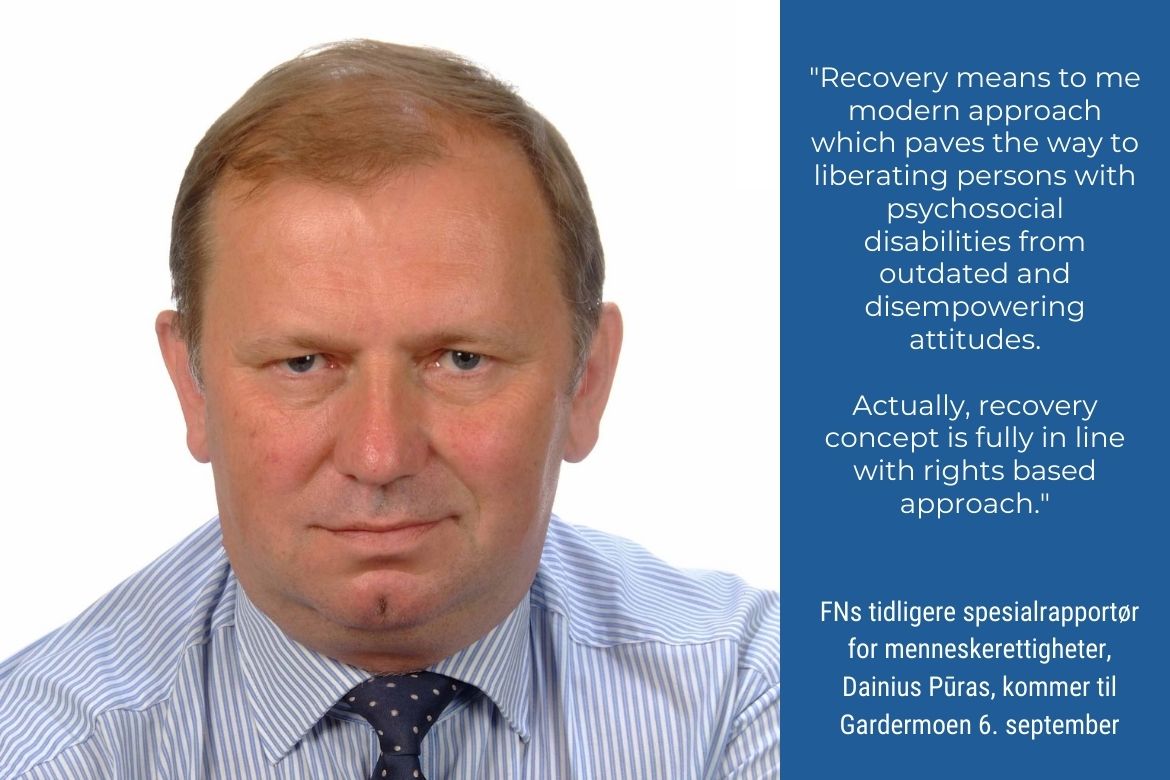Intervju med FNs tidligere spesialrapportør for menneskerettigheter, Dainius Puras

FNs tidligere spesialrapportør for menneskerettigheter til Gardermoen
Siden 2002 har FN hatt en spesialrapportør for alle menneskers rett til å nyte den høyest oppnåelige standarden for fysisk og mental helse (Special Rapporteur on the right of everyone to the enjoyment of the highest attainable standard of physical and mental health).
Fra 2014-2020 var denne rollen besatt av Dainius Pūras, en lege og professor fra Litauen. Pūras har engasjert seg for menneskerettigheter i over 30 år. I FN-rapporten fra april 2020 kan vi lese at
«An important message within that collective failure is that without addressing human rights seriously, any investment in mental health will not be effective. Attacks on universal human rights principles threaten the physical, political, social and economic environment, and actively undermine the struggle for positive mental health and well-being.”
I september kommer Pūras til Gardermoen for å holde innlegget Mental health and human rights: insights on past, present and future. I den forbindelse har vi hatt et lite e-postintervju med Pūras. Siden Pūras kommer fra Litauen, er intervjuet på engelsk.
Se hele programmet for Ingenting om oss uten oss 2022 | Meld deg på konferansen
Intervju med Puras
The conference at Gardermoen hope to bring people with various backgrounds together: user organizations, professionals, teaching and research environments and preferably also politicians. What will be your most important message in your speech?
My main message will be that global mental health needs to critically assess the "status quo" and to abandon the legacy of discrimination of persons who need support and use mental health services. This is unacceptable, that many people suffer from human rights violations, and that this is often done in the name of medicine and psychiatry. Human rights based approach and main principles of the CRPD convention need to be applied within and beyond mental health services in persistent and non-selective way.
Mental health and human rights in 2022 – what are your main concerns? And your greatest hope for the future?
"My main concern is that human rights based approach, in general and particularly in psychiatry, continues to be under attack on global scale.. In many countries, even in democracies, this approach is used in selective and populistic way. This leads to accumulation of harmful effects of discrimination, violence and inequalities. Sometimes there is a feeling that collective memory of humankind has been impaired. In many countries space for civil society is shrinking dramatically.
Many people were surprised when Russia launched a full scale invasion in Ukraine. But this was a logical consequence of global community having turned blind eye on what was happening in Russia for last two decades – and that was total erosion of all elements of democracy and respect to human rights. Also, regress of psychiatry in Russia, amounting to political abuse of psychiatry, was tolerated by global and European psychiatric organizations, as well as by other international organizations.
In many other regions and countries democracy and space for civil society is threatened. How can we expect that rights of persons with mental health condtions are protected, when human rights of everyone are violated? Alternative agendas, such as „protection of traditional family values“ are escalated, to oppose universal human rights principles, and to attack human rights of children, women, migrants and refugees, LGBTQ+ persons and other groups in vulnerable situations."
There is always hope
"On the other hand, there is always hope. Liberal democracies, in Europe and globally, are united more than ever, and understand now better that prevention of war is about protection of the very foundations of democracy and human rights. There is also measurable progress in global mental health. In all regions, in global south and in global north, there are many innovative services that challenge the „status quo“. The WHO issued a very important document in 2021 – „Guidance on community mental health services“, and I was happy to find in that document many main messages that are in line with my report from 2017 and other reports. So, what was considered by many experts , especially by leaders of psychiatry, as heresy in 2017, after some years was supported by the WHO. "
After your time as Special Rapporteur at the UN, what is the most important thing you have learned?
"I had unique opportunity to observe the global scene. My mandate was a global one. I travelled to many countries, with official country missions and with informal visits. My previous experience was based mainly on European experience, and especially on situation in central and eastern Europe. I was idealizing liberal democracies, and I was thinking that Nordic countries, Canada, the Netherlands, Switzerland or Australia have managed to effectively address main human rights issues, including human rights in mental healthcare.
After many visits and meetings, I realized that all countries, including liberal democracies, are trapped in ineffective mental health policies and services. One of my insights was that selective approach to human rights, which is prevalent in main academic centers of psychiatry in European and North American countries, paves the way and supports proliferation of human rights violations in mental healthcare throughout the globe. In other words, the responsibility of developed countries is huge. If the messages come from capitals of global North that status quo, with widely spread legalized coercion, overmedicalization, discrimination is OK, then many other countries will use this argument and will continue with systemic abuses in the field of psychiatry. As we know, if so called exceptions are allowed by the law to undermine human rights, then these exceptions turn in many countries into the rule. This is absolutely unacceptable and should stop.
Even if we have seen progress regarding human rights within the same field, it's important to go on fighting and develop human rights. Every generation need to regain and develop human rights a step foreward, and there are also backlash in many areas, both in countries and within certain fields. "
The conference in September is about recovery, and human rights, citizenship and democratic participation in the field of mental health and substance abuse. What does Recovery mean to you?
"Recovery means to me modern approach which paves the way to liberating persons with psychosocial disabilities from outdated and disempowering attitudes. Actually, recovery concept is fully in line with rights based approach. Recovery can be seen as an important element in human rights, and vice versa.
It also offers solution to psychiatry – if psychiatry understands that it needs to seriously address problems of its image and reputation. This is a very promising approach which needs to be supported so that it turns from the status of “alternative services” into the status of mainstreamed services with serious support from governments. We still need to do a lot in this direction in all countries. "

